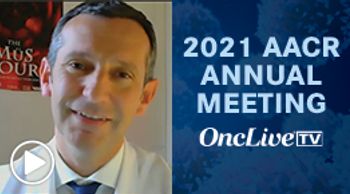
Benjamin Besse, MD, discusses the results of an ad-hoc safety analysis of the phase 1/2 LIBRETTO-001 trial, which examined the use of selpercatinib in patients with RET-altered advanced medullary thyroid cancer and non–small cell lung cancer.

Your AI-Trained Oncology Knowledge Connection!


Benjamin Besse, MD, discusses the results of an ad-hoc safety analysis of the phase 1/2 LIBRETTO-001 trial, which examined the use of selpercatinib in patients with RET-altered advanced medullary thyroid cancer and non–small cell lung cancer.
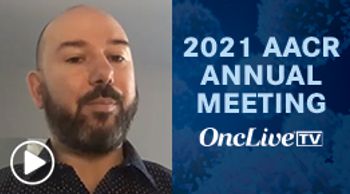
Paz Polak, PhD, discusses research that evaluated cancer genomes in Ghana through the use of liquid biopsies.

Thomas Urban Marron, MD, PhD, discusses primary objectives of a study examining the use of an adjuvant personalized neoantigen peptide vaccine in several malignancies.

The combination of copanlisib and rituximab was associated with a 48% reduction in the risk of disease progression or death compared with rituximab plus placebo in patients with relapsed indolent non-Hodgkin lymphoma.

Maintaining a healthy lifestyle was found to reduce the likelihood of developing metastatic disease or dying of prostate cancer among men who had a high genetic risk.

The presence of pathogenic or likely pathogenic germline variants in cancer predisposition genes, which were identified in approximately 1 in 5 patients with neuroblastoma and were mostly inherited, was shown to correlate with worse event-free survival and overall survival vs the absence of germline variants.
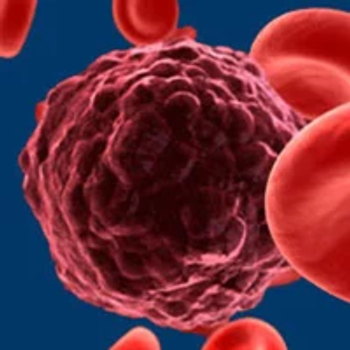
The CDK9 inhibitor voruciclib demonstrated early activity as a single agent in KRAS-mutant cancer cell lines, and synergistically inhibited growth of KRAS-mutant cancers when used in combination with sotorasib and adagrasib in preclinical models.

Tebentafusp (IMCgp100) resulted in a highly significant and clinically meaningful improvement in overall survival when given as a frontline treatment in patients with metastatic uveal melanoma.

Neoadjuvant treatment with nivolumab combined with chemotherapy led to a significant improvement in pathologic complete response compared with chemotherapy alone in patients with resectable non–small cell lung cancer.

Faculty from the Miami Breast Cancer Conference® discuss how to apply the RxPONDER data to clinical practice.

Axel Grothey, MD, discusses the differences between available assays evaluating circulating tumor DNA in colorectal cancer.
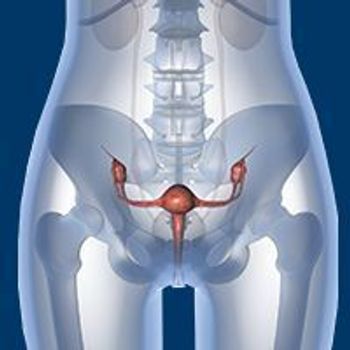
The combination of mirvetuximab soravtansine and rucaparib was found to be well tolerated, with encouraging activity reported in heavily pretreated patients with endometrial, ovarian, fallopian tube, or primary peritoneal cancer.

A regimen comprised of a single 300-mg priming dose of tremelimumab and 1500 mg of durvalumab every 4 weeks yielded favorable efficacy and an acceptable safety profile in patients with advanced HCC.

Suresh S. Ramalingam, MD, FASCO, deputy director, director, Lung Cancer Program, Winship Cancer Institute of Emory University, professor, assistant dean, Roberto C. Goizueta Distinguished Chair for Cancer Research, director, Division of Medical Oncology, Department of Hematology and Medical Oncology, Emory University School of Medicine, discusses treatment after osimertinib (Tagrisso) in EGFR-mutant non–small cell lung cancer (NSCLC).

More patients with stage III non–small cell lung cancer received sequential chemoradiation and delayed the time to durvalumab treatment in a real-world setting compared with those enrolled on the phase 3 PACIFIC trial.

Osimertinib (Tagrisso) showcased encouraging efficacy and acceptable safety in patients with EGFR-positive, advanced non–small cell lung cancer. according to real-world findings from an observational, multicenter study.

Although the combination of atezolizumab and bevacizumab has become the standard frontline treatment for patients with advanced hepatocellular carcinoma, whether immunotherapy could play a role in earlier lines of treatment remains the subject of ongoing research.

Combinations of checkpoint inhibitors and VEGF TKIs, as well as dual checkpoint blockade, are affording patients with advanced hepatocellular carcinoma greater potential for disease control and deep, long-lasting responses, underscoring the need for biomarkers of response to combination regimens and single-agent TKIs, the latter of which still play a role for select populations.
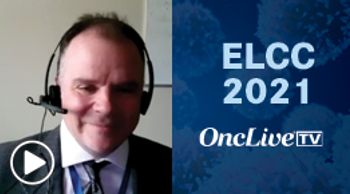
Andrew G. Robinson, MD, MSc, FRCPC, discusses the updated results of the phase 3 KEYNOTE-407 trial in squamous non–small cell lung cancer.
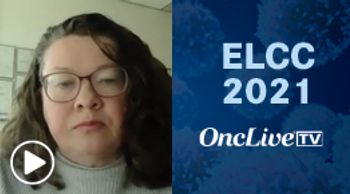
Lyudmila A. Bazhenova, MD, discusses the results of a preliminary exploratory correlative analysis of the phase 1/2 KRYSTAL-1 trial in advanced non–small cell lung cancer.

Treatment with chemotherapy plus immunotherapy did not demonstrate significant clinical benefit over chemotherapy alone in patients with EGFR-mutated non–small cell lung cancer after progression on osimertinib.

Previous exposure to immune checkpoint inhibitors or osimertinib has been linked with poor outcomes in patients with non–small cell lung cancer who were receiving a subsequent atezolizumab-containing regimen.

Amit Singal, MD, discusses downstaging strategies for patients with hepatocellular carcinoma.

The half-life extended, DLL3-targeting bispecific T-cell engager AMG 757 demonstrated early signals of efficacy and a favorable safety profile in patients with small cell lung cancer.

Adagrasib yielded durable responses and broad disease control, in addition to providing extensive predicted coverage throughout the dosing interval, in patients with KRAS G12C–mutant advanced non–small cell lung cancer.
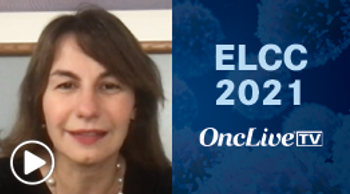
Marina Chiara Garassino, MD, discusses the rationale for the phase 2 PACIFIC-6 trial in non–small cell lung cancer.

First-line treatment with camrelizumab, an investigational PD-1 inhibitor, plus chemotherapy induced robust and durable clinical responses in patients with advanced squamous non–small cell lung cancer.

The fatty acid synthase inhibition caused by AZ12756122 could represent a promising therapeutic alternative to overcome resistance to EGFR TKIs because of the synergistic interaction that it has with osimertinib and its ability to reduce cancer stem cell properties in EGFR-mutant non–small cell lung cancer cell models.

The frontline combination of nivolumab and ipilimumab plus 2 cycles of chemotherapy demonstrated an improvement in overall survival vs chemotherapy alone in patients with advanced non–small cell lung cancer regardless of tumor mutational burden status in the tissue or blood.

Dostarlimab demonstrated durable antitumor activity in patients with mismatch repair deficient and MMR proficient endometrial cancer, regardless of investigator assessment or blinded independent central review and immune-related RECIST or RECIST v1.1 criteria.